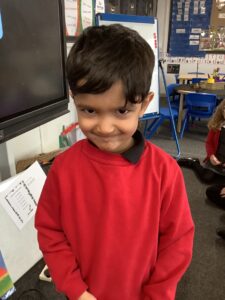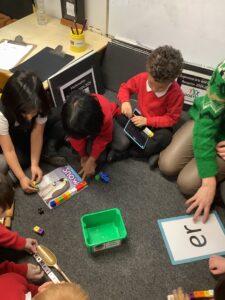First of all this week, congratulations to all of Year 4 who won their Skipping School heat against four other Leeds schools and have now qualified for the Leeds final in June.
Also, well done to our Year 3 and 4 cross country runners who represented Leeds in the West Yorkshire final yesterday. We had a Year 3 top 10 finisher out of 146 runners and the Year 3 girls team achieved 6th place out of 21 teams.
The rest of this week’s message is about Computing, our current topic…
This half-term, we’re developing our knowledge of computers and computer programming.
Computer programming is super. Creating games, animations and solving real world problems is fun and encourages creativity – it’s challenging, too!
Importantly, the skills your child will use and develop are transferable to other subjects and areas of life. For example, the concept of decomposition in programming is concerned with breaking down a large task into smaller chunks. This concept could be used when writing a story, solving a maths problem or tidying a particularly messy bedroom! The process of debugging is about identifying and fixing an error in a program. It requires systematic, objective thinking and plenty of resilience.
Each phase has age-related specific knowledge, skill sand vocabulary. See pages 12 and 13 of our Topic Curriculum Guide.
Years 1 and 2
Children will learn about how technology is used beyond school in our homes and all around us. They’ll begin to consider what a computer is and isn’t.
In programming lessons, they’ll create animations in Scratch Jr by creating and debugging algorithms. They’ll then continue to use Scratch Jr to create an interactive quiz.
Years 3 and 4
Children will reason about what exactly makes a computer a computer. Is a games console a computer? Is a TV a computer? Is a bedside lamp a computer? Next, they will learn about inputs and outputs and identify different examples of them in everyday technology.
They’ll then be introduced to Scratch. They will learn how they can add or change sprites and backdrops and then begin to experiment with making their sprites move. They’ll look at programs created on Scratch and use logical reasoning to explain what will happen when these programs are run. They’ll learn about the importance of sequencing in programming when they recreate a well-known melody. Finally, they’ll create their own ‘band’ on Scratch by programming different instrument sprites to play sounds.
Years 5 and 6
Children will learn about what a computer network is and that the Internet is an enormous computer network. They’ll also learn about the difference between the Internet and the World Wide Web.
In programming lessons, they’ll be introduced to BBC Microbits – pocket sized computers – which they’ll program to do lots of different things. This will allow children to gain a deeper understanding of concepts like sequence, selection and variables.
Some of this vocabulary may sound alien to you but, as the topic goes on, your child will be able to tell you what they mean and give examples of how they’ve used them in their projects. Some of the projects your children will be making are a magic 8-ball style program which will give you an answer to all your questions and a pedometer to count the number of steps they’re making.
How can you help?
Talk to your child about what they’ve been learning in class. Class News is a good place to go to find out more about what your child’s up to in school.
The school library and local libraries have lots of books about coding and computer games which your child will be able to borrow and develop both their reading skills and computing knowledge.
Finally, try programming with your child. There are loads of programming apps and software available to download, often for free.
Here’s a list for Key Stage 1:
- Daisy the Dinosaur (Apple only)
- Beebot
- Tynker Junior
- Scratch Jr
- Code Karts
…And one for Key Stage 2:
- Lightbot
- Tynker
- Scratch Jr
- Scratch








































